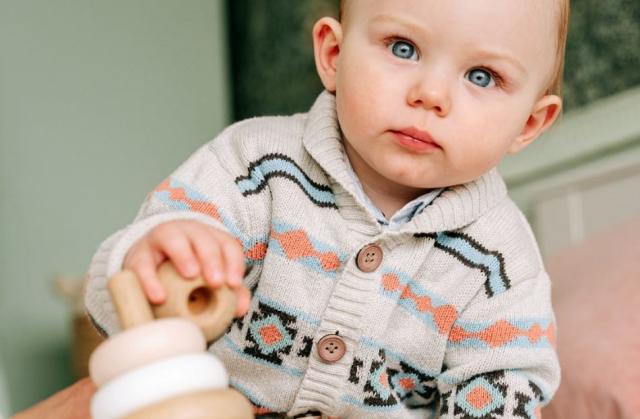Separation anxiety at bedtime can be exceptionally triggering for parents. The child’s need for safety and closeness is at stark odds with the parent’s need for time alone at the end of a busy day.
Understanding is key: Separation anxiety is a very common developmental phase that arises around the 5 or 6 month mark and which peaks at 14 – 18months. It can then peak again when the child transitions to playschool/school and generally, it fades over time as the child gets older. It can re-emerge at times of transition or stress in a child’s life.
Separation anxiety can be heightened at night-time and there are valid evolutionary and attachment based reasons for this. Spending a long time alone in the dark without your main caregiver there to protect you, is against our survival instinct. This activates a threat response in your child’s amygdala (the ‘survival’ part of the brain). It is also true that unresolved issues or stress during the day-time, as well as illness or pain, can increase the intensity of separation anxiety at night time.
Day-time strategies: It might seem counterintuitive, but there are lots of strategies that you can implement during the day to help ease the separation at night-time. These include:
Practice separations: this gives your child’s nervous system some ‘practice reps’ at separation so that their nervous system may be less reactive to the separation at night time.
Role-play: use dolls or teddies to practice the bedtime routine. Act out the routine with the dolls when playing with your child (e.g. Mammy teddy is putting baby teddy to bed). This allows you to practice your ‘goodnight’ ritual, which in turn makes it easier for you at night time and you are more likely to remember what you wanted to say.
Fun and Exercise: Having fun and ensuring your child gets plenty of exercise during the day is also helpful. This helps to increase your child’s serotonin levels so that they are naturally feeling more calm and regulated at night time.
Daytime stressors: It is important that you address any stressful situations that are going on for your child during the day. Often children do not start to process these until later in the evening when activities have stopped and their mind has more time to recollect the day. Try to have ‘talk time’ earlier in the evening. If your child is younger, you can check in with their creche/playschool to see if anything dysregulating has happened throughout the day.
Connection time is also very important during the daytime! Sometimes children will try to delay bedtime in order to get more connection time with parents. This can be especially true if you work outside of the home for long periods. Where possible, it can help to give some brief one-to-one time with your child each day, even if it is just 10mins.
Explain the plan and implement it!
The following is a plan to help manage a situation where a child is too afraid to go asleep alone in their own room.
It is important to explain what you are doing to your child. Depending on your child’s level of understanding, it might sound like:
“I know that sleeping is tricky for you at the moment. It sounds like your brain is telling you that it is scary to be without mummy (or whatever the fear/issue is) when really there is nothing to be afraid of as mummy is always downstairs even when you can’t see her.
I was a bit like this when I was small and my mum came up with this plan that really worked. Want to hear it? So, for the first few nights, I will stay in your room with you until you fall asleep. I won’t always do this but I will for now. I will sit here and do some work but I won’t be talking to you. “
Then stay in your child’s room sitting by their bed until they fall asleep. Stay at this distance for about 3 – 4 nights and once their fear decreases and their tolerance for distance increases, you can move further away.
Moving further away
When you plan to move further away, inform them of this during the day. You might say something like “Tonight I’ll be sitting over near the cabinet. I will still be in the room until you fall asleep. Just like before.”
If your child becomes upset when you put the plan into action, perhaps play some music, a story or sing a bedtime song. You can come closer to the bed to comfort them, but then move back gradually. If you have a nighttime mantra or prayer that you use, repeat this a few times before moving back to your original position.
Keep it up
Continue this process of moving further away until you are just inside the door, just outside the door, in the hallway and so on.
It is important to look after yourself while implementing these steps and it can really help to try to ‘set your nervous system up’ during the day by doing things that help you to remain grounded (exercise, chat with friends, a walk before bedtime starts).
A phrase or mantra can also help such as “This is a phase. This will end”; “If I get angry now, it will make her/him more dysregulated and less likely to sleep”. “This will end. There will be a moment soon when my child is asleep”.
“But am I giving in?”
This is a common question that I get asked when I suggest to parents that they stay in the room with their child. This is where the ‘dependency paradox’ comes in! When one feels that they can depend on their secure figure for safety and security, they are more willing to explore their world and feel safe on their own. We cannot create a sense of independence by leaving a child terrified in their bed. You are not giving in, you are facilitating the growth over their independence in a measured and supportive way. There are decades of research to back this up (e.g. Bowlby’s attachment studies). When we accept dependence, independence blossoms in time.
“But this takes up so much time and energy!”
This is also something that some parents say to me, and they are right! However, it also takes a lot of time, energy, stress and upset to battle with your child every night while making no progress in terms of fostering independence. The time and energy that you invest in the above strategies will pay off.
If you continue to experience persistent and significant issues with separation anxiety at night time, you may wish to seek additional professional support to help you with this.
Instagram: @dr_rebecca_quin
Dr. Rebecca Quin
Chartered Senior Clinical Psychologist
Dr. Rebecca Quin is a chartered senior clinical psychologist & director of the Psychology Practice, Bray which she founded in early 2022. The practice caters for children and adolescents who are experiencing mental health difficulties.
She has 15 years experience working with younger people & their parents within primary care, disability and acute mental health settings. She has also worked in the area of neuropsychology in King’s College Hospital and the Maudsley hospital, London as well as Beaumont hospital in Dublin, Ireland.
Rebecca’s areas of special interest include childhood anxiety, autism and the relationship between physical activity and mental health. She is currently delivering online and in person workshops for parents and schools on these topics. She also carries out a wide range of assessments for children and teens.










